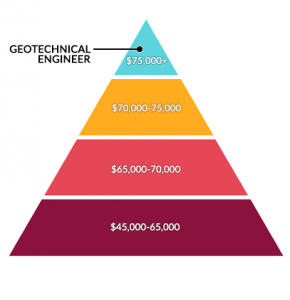The Best Guide To Geotheta
Table of ContentsExcitement About GeothetaThe Ultimate Guide To GeothetaThe Best Guide To GeothetaThe Best Guide To GeothetaExamine This Report on Geotheta

They conduct website investigations, accumulate samples, execute research laboratory examinations, and analyze information to evaluate the suitability of the ground for building and construction projects - Tailings Engineer. Based upon their searchings for, geotechnical designers provide suggestions for structure layout, incline security, keeping structures, and mitigation of geotechnical threats. They collaborate with other specialists, such as engineers, structural designers, and building and construction teams, to guarantee that geotechnical factors to consider are integrated into the overall task style and implementation
By examining the behavior and residential properties of soil and rock, they can recognize potential geotechnical dangers such as landslides, dirt settlement, or incline instability. Their competence assists stop failures or accidents that could endanger lives and home. Below are some in-depth responsibilities and obligations of a geotechnical engineer: Site Examination: Geotechnical designers conduct website investigations to gather data on subsurface problems.
They analyze the information to understand the homes and habits of the soil and rock, including their stamina, permeability, compaction attributes, and groundwater problems. Geotechnical Analysis and Design: Geotechnical engineers evaluate the data collected throughout website examinations to examine the security and suitability of the site for building jobs. They do geotechnical estimations and modeling to assess elements such as bearing capability, settlement, slope stability, side earth pressures, and groundwater circulation.
How Geotheta can Save You Time, Stress, and Money.
Structure Style: Geotechnical engineers play a critical duty in creating foundations that can safely sustain the designated structure. They analyze the soil conditions and tons demands to figure out the ideal structure kind, such as superficial structures (e.g., grounds), deep structures (e.g (https://www.producthunt.com/@geotheta1)., heaps), or specialized methods like dirt renovation. They take into consideration variables such as settlement limits, bearing capability, and soil-structure communication to develop ideal structure designs
They examine building plans, monitor site tasks, and conduct field assessments to confirm that the layout recommendations are followed. If unexpected geotechnical problems develop, they assess the scenario and offer referrals for removal or adjustments to the style. Threat Assessment and Reduction: Geotechnical designers evaluate geotechnical hazards and dangers connected with the task website, such as landslides, liquefaction, or soil disintegration.

Partnership and Interaction: Geotechnical engineers function closely with various other professionals associated with a project, such as engineers, architectural engineers, and building groups. Reliable interaction and collaboration are necessary to incorporate geotechnical factors to consider right into the overall project style and building procedure. Geotechnical engineers offer technical competence, answer inquiries, and guarantee that geotechnical demands are satisfied.
What Does Geotheta Do?
Below are some kinds of geotechnical designers: Structure Engineer: Foundation engineers focus on making and evaluating structures for frameworks. They analyze the dirt problems, load requirements, and site qualities to establish one of the most appropriate foundation type and design, such as shallow foundations, deep foundations, or specialized methods like stack foundations.
They examine the aspects affecting incline security, such as soil homes, groundwater problems, and slope geometry, and develop approaches to avoid slope failures and reduce risks. Earthquake Designer: Quake engineers focus on examining and developing structures to endure seismic forces. They assess the seismic hazard hop over to here of a site, review dirt liquefaction capacity, and develop seismic design standards to make certain the safety and security and durability of structures during quakes.
They do field testing, accumulate examples, and evaluate the collected information to define the soil residential properties, geologic formations, and groundwater problems at a site. Geotechnical Instrumentation Designer: Geotechnical instrumentation engineers concentrate on surveillance and determining the habits of soil, rock, and frameworks. They mount and preserve instrumentation systems that keep track of factors such as dirt settlement, groundwater degrees, slope movements, and architectural displacements to assess efficiency and provide very early warnings of possible problems.
Some Known Factual Statements About Geotheta
They carry out examinations such as triaxial tests, consolidation examinations, direct shear tests, and leaks in the structure tests to gather data for geotechnical evaluation and layout. Geosynthetics Engineer: Geosynthetics designers concentrate on the layout and application of geosynthetic materials, such as geotextiles, geogrids, and geomembranes. They utilize these products to improve soil security, enhance slopes, supply water drainage services, and control erosion.
They often tend to be investigative individuals, which suggests they're intellectual, reflective, and investigative. They wonder, methodical, logical, logical, and sensible. Some of them are also social, suggesting they're kind, generous, participating, patient, caring, practical, understanding, sensible, and pleasant. Does this seem like you? Take our free profession test to locate out if geotechnical engineer is one of your top profession suits.
In the office environment, geotechnical engineers utilize specialized software program tools to do computations, develop styles, and evaluate information. They prepare records, evaluation project specs, interact with customers and team members, and coordinate project tasks. The workplace setup provides a favorable setting for research study, evaluation, and collaboration with various other experts entailed in the project.
Geotheta Can Be Fun For Anyone
They often see job sites to carry out site investigations, analyze geotechnical conditions, and collect information for evaluation. These visits entail traveling to various areas, in some cases in remote or difficult terrains. Geotechnical designers may do dirt tasting, conduct tests, and monitor building tasks to guarantee that the geotechnical elements of the task are being implemented appropriately.
Geotechnical engineers likewise work in specialized geotechnical labs. Geotechnical lab engineers function extensively in these environments, dealing with testing devices, operating instruments, and tape-recording information.